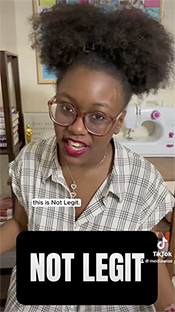Overview
Learn media literacy through media creation — A good digital citizen makes sure that information liked, shared or posted online is accurate, fair, balanced and appropriate for the audience. Learn how to produce your own fact-check video about potential misinformation online to demonstrate your media literacy skills. For grades 6- 12 (One to two weeks)
Objectives
Students will be able to:
- Identify a “claim” online to fact-check
- Use the media literacy strategies to fact check a claim
- Write an engaging two-column script
- Film and edit a fact-check video using best practices for setting, composition, lighting, and audio

Downloadable Lesson Documents
Lesson Resources
- Sample Script
- Blank Two-Column Script Template
- Sample Reel 1; Sample Reel 2; Sample Reel 3
Before You Watch
Discussion: How could I produce my own fact-check video? Resources:
While You Watch
Preview the following questions. Answer them while they watch the How2Internet video…
- When looking for a “claim” to fact check, make sure it is “checkable” and not an _______________ or prediction.
- Places to look for posts to fact-check include claims _______________ on social media, other _______________ - checkers, daily news websites or apps such as Reuters, the Washington Post, or Politifact, and topics that already have a lot of _______________ circulating
- What three questions should you ask about a claim you see online?
- Tips to writing an engaging script:
- It is important to _______________ your evidence in the right column so it can be verified by your editor or teacher.
- Some tips for filming to make sure you look and sound great:
- Put the _______________ and the claim in the caption in case someone doesn’t tune in for the full video. Stop the spread of misinformation in its tracks!
- Choose a song without _______________ , and it must be copyright free.
After You Watch
- Why should you avoid clicking on the first several results when conducting an Internet search?
- What would be some of the most useful tips in this lesson to search for information for a research paper or project? Why?
- Why is it a good idea to limit the use of “cookies” on a web browser?
Exit Ticket
List three topics you would be interested in looking for a claim to fact-check.
Standards
CC.9-10.R.H.9 Integration of Knowledge and Ideas: Compare and contrast treatments of the same topic in several primary and secondary sources.
CC.ELA-LITERACY.RL.6 Analyze a case in which grasping a point of view requires distinguishing what is directly stated in a text from what is really meant (e.g., satire, sarcasm, irony, or understatement).
CC.ELA-LITERACY.RL.1 Cite strong and thorough textual evidence to support analysis of what the text says explicitly as well as inferences drawn from the text, including determining where the text leaves matters uncertain.
Chris Schwalm is a youth producer at PBS NewsHour Student Reporting Labs (SRL). Before coming to SRL, Chris taught high school journalism for 20 years in Lancaster, Penn. For 12 of those years, Chris reported on nights and weekends for the Lancaster News. In addition to the How2Internet series, Chris wrote SRL and MediaWise’s Teen Fact Checking Network lesson series on media literacy. You can reach him on Twitter/X @cschwalm.
These lessons were developed by PBS NewsHour Student Reporting Labs in partnership with MediaWise and the Teen Fact-Checking Network, which are part of the Poynter Institute. This partnership has been made possible with support from Google.
To provide feedback on this resource, please fill out the form here.





